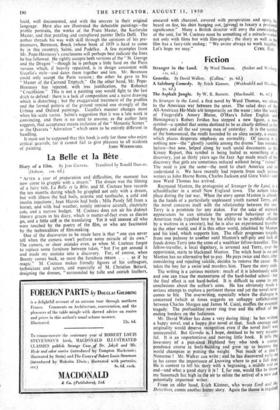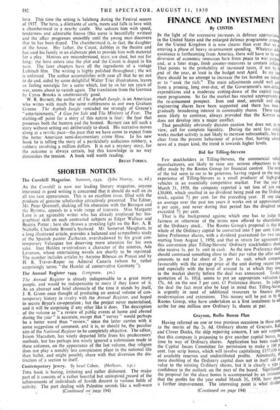Fiction
t 2s. 6d.) The Asphalt Jungle. By W. R. Burnett. (Macdonald. 8s. 6d.) IN Stranger in the Land, a first novel by Ward Thomas, we return to the American war between the sexes. The- salad days of the All-American He-Male are temporarily on the wane ; into the world of Fitzgerald's Amory Blaine, O'Hara's Julien English and Hemingway's Robert Jordan has stepped a new figure, a new symbol—a symbol that seems destined to be as clearly defined as the flappers and all the sad young men of yesterday. It is the symbol of the homosexual, the misfit hounded by an alien society, a society which places desperate emphasis on normality. Of course it is nothing new—the " ghostly rumble among the drums " has sounded before—but now, helped along by such- social documents as the Kinsey Report, this symbol is being hailed as something of a discovery, just as thirty years ago the Jazz Age made much of the discovery that girls are sometimes seduced without being " ruined." The need is just the same—the need to chart America and to understand it. We have recently had reports from such serious writers as John Horne Burns, Charles Jackson and Gore Vidal—and now Ward Thomas has arrived.
Raymond Manton, the protagonist of Stranger in the Land, is a schooltiacher in a small New England town. The action takes place during the last war. When the story opens Manton is already in the hands of a particularly unpleasant youth named Terry, and the novel concerns itself with the relationship between the two. Terry is a prostitute for any stakes. For the sake of outward appearances he can simulate the approved behaviour of the American male (typified here by his ability to be publicly affected by a waitress in a sweater), but he is also an experienced traveller in the other world, and if is this other world, inhabited by Manton and his kind, which supports him. The, affair progresses turgidly from one jealousy to another until Manton's self-pity and lack of funds drives Terry into the arms of a wealthier fellow-traveller. This fellow-traveller, a local dignitary, is arrested and Terry, ever the opportunist, starts to blackmail Manton. The witch hunt is on and Manton has no alternative but to pay. He pays twice and then, after considering and rejecting suicide, decides to remove the cause. He takes the boy for a swim' and murders him. There the story ends.
The writing is a curious mixture: much of it is laboriously solid and one can trace the mannerisms of the hard-boiled school—but the final effect is not hard-boiled. It is difficult to come to any conclusions about the author's aims. He has obviously made a serious attempt to explore a pertinent theme and yet the novel never comes to life. The overwriting, especially where the dialogue is concerned (which at times suggests an unhappy collaboration' between Charles Morgan and James M. Cain), muffles the essential tragedy: The profundities never ring true and the effect of the ending borders on:the-ludicrous. 1 Mr. David Walker has done a very daring thing: he has written a happy novel, and a happy first novel at that, Such courage and originality would deserve recognition even if the novel itself was unsuccessful. But Geordie is, I hope, destined to be very success- ful. It is an unpretentious and moving little book. It tells the love-story Of a pint-sized Highland boy who took a corres; pondence course in body-building and grew up to become the world champion at putting the weight. Not much of a plot ? Nonsense 1 Mr. Walker can write ; and he has discovered early on in his career the_ importance of knowing where to put a full stop. He is content to tell his story with a beginning, a middle and an end—and what a good story it is ! I, for one, would like to throw my Sassenach hat high in. the air to salute the arrival of- a new and potentially important writer.
FroM an older hand, Erich Kastner, who wrote Emil and the y. Again the theme is requited
Detectives, comes another..happy stor love. This time the setting is Salzburg during the Festival season of 1937. The hero, a dilettante of sorts, meets and falls in love with a chambermaid in a nearby castle. She seduces him with speed, tenderness and admirable finesse (this scene is beautifully written) and the affair progresses smoothly until the young man discovers that he has been duped. The chambermaid is, in fact, the daughter of the house. Her father, the Count, dabbles in the theatre and has used his family in an elaborate plot to provide him with material for a play. Motives are misunderstood, tears are shed, but not for long: the hero enters into the plot and the Count is duped in his turn. The later chapters have all the ingredients of a vintage Lubitsch film. The writing is highly polished throughout ; the wit is unforced. The author accomplishes with ease all that he set out to do and, aided by some delightful Walter Trier illustrations, leaves us feeling nostalgic for a scene which, lost to us for ten years of war, seems about to vanish again. The translation from the German by Cyrus Brooks is unobtrusively good.
W. R. Burnett, the author of The Asphalt Jungle, is an American who writes with much the same ruthlessness as our own Graham Greene. The Asphalt Jungle reminded me strongly of Greene's " entertainments," A Gun for Sale and The Ministry of Fear. The starting-off point for a story of this nature is fear : the fear that possesses both the hunters and the hunted. Burnett can tell such a story without setting out deliberately to shock His narrative moves along at a terrific pace—the pace that we have come to expect from the better American semi-documentary crime films. In his new book he is telling the story of a particularly audacious robbery, a robbery involving a million dollars. It is not a mystery story, for the outcome is always certain, but this knowledge in no way diminishes the tension. A book well worth reading.
BRYAN FORBES.



































 Previous page
Previous page